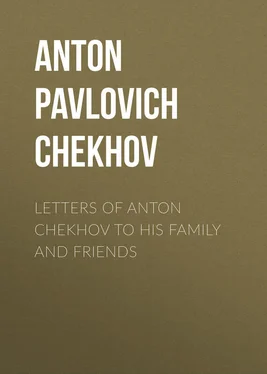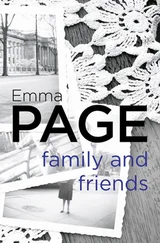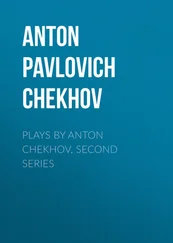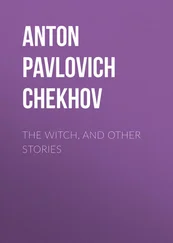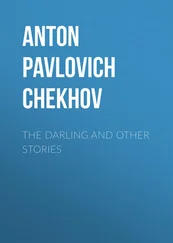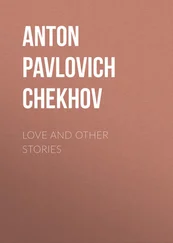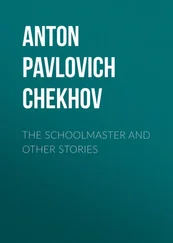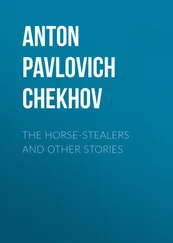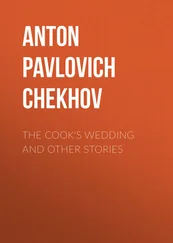Anton Chekhov - Letters of Anton Chekhov to His Family and Friends
Здесь есть возможность читать онлайн «Anton Chekhov - Letters of Anton Chekhov to His Family and Friends» — ознакомительный отрывок электронной книги совершенно бесплатно, а после прочтения отрывка купить полную версию. В некоторых случаях можно слушать аудио, скачать через торрент в формате fb2 и присутствует краткое содержание. Жанр: Старинная литература, Русская классическая проза, на английском языке. Описание произведения, (предисловие) а так же отзывы посетителей доступны на портале библиотеки ЛибКат.
- Название:Letters of Anton Chekhov to His Family and Friends
- Автор:
- Жанр:
- Год:неизвестен
- ISBN:нет данных
- Рейтинг книги:4 / 5. Голосов: 1
-
Избранное:Добавить в избранное
- Отзывы:
-
Ваша оценка:
- 80
- 1
- 2
- 3
- 4
- 5
Letters of Anton Chekhov to His Family and Friends: краткое содержание, описание и аннотация
Предлагаем к чтению аннотацию, описание, краткое содержание или предисловие (зависит от того, что написал сам автор книги «Letters of Anton Chekhov to His Family and Friends»). Если вы не нашли необходимую информацию о книге — напишите в комментариях, мы постараемся отыскать её.
Letters of Anton Chekhov to His Family and Friends — читать онлайн ознакомительный отрывок
Ниже представлен текст книги, разбитый по страницам. Система сохранения места последней прочитанной страницы, позволяет с удобством читать онлайн бесплатно книгу «Letters of Anton Chekhov to His Family and Friends», без необходимости каждый раз заново искать на чём Вы остановились. Поставьте закладку, и сможете в любой момент перейти на страницу, на которой закончили чтение.
Интервал:
Закладка:
TO D. V. GRIGOROVITCH
MOSCOW, 1887.
I have just read “Karelin’s Dream,” and I am very much interested to know how far the dream you describe really is a dream. I think your description of the workings of the brain and of the general feeling of a person who is asleep is physiologically correct and remarkably artistic. I remember I read two or three years ago a French story, in which the author described the daughter of a minister., and probably without himself suspecting it, gave a correct medical description of hysteria. I thought at the time that an artist’s instinct may sometimes be worth the brains of a scientist, that both have the same purpose, the same nature, and that perhaps in time, as their methods become perfect, they are destined to become one vast prodigious force which now it is difficult even to imagine… “Karelin’s Dream” has suggested to me similar thoughts, and to-day I willingly believe Buckle, who saw in Hamlet’s musings on the dust of Alexander the Great, Shakespeare’s knowledge of the law of the transmutation of substance – i.e., the power of the artist to run ahead of the men of science… Sleep is a subjective phenomenon, and the inner aspect of it one can only observe in oneself. But since the process of dreaming is the same in all men, every reader can, I think, judge Karelin by his own standards, and every critic is bound to be subjective. From my own personal experience this is how I can formulate my impression.
In the first place the sensation of cold is given by you with remarkable subtlety. When at night the quilt falls off I begin to dream of huge slippery stones, of cold autumnal water, naked banks – and all this dim, misty, without a patch of blue sky; sad and dejected like one who has lost his way, I look at the stones and feel that for some reason I cannot avoid crossing a deep river; I see then small tugs that drag huge barges, floating beams… All this is infinitely grey, damp, and dismal. When I run from the river I come across the fallen cemetery gates, funerals, my school-teachers… And all the time I am cold through and through with that oppressive nightmare-like cold which is impossible in waking life, and which is only felt by those who are asleep. The first pages of “Karelin’s Dream” vividly brought it to my memory – especially the first half of page five, where you speak of the cold and loneliness of the grave.
I think that had I been born in Petersburg and constantly lived there, I should always dream of the banks of the Neva, the Senate Square, the massive monuments.
When I feel cold in my sleep I dream of people… I happened to have read a criticism in which the reviewer blames you for introducing a man who is “almost a minister,” and thus spoiling the generally dignified tone of the story. I don’t agree with him. What spoils the tone is not the people but your characterization of them, which in some places interrupts the picture of the dream. One does dream of people, and always of unpleasant ones… I, for instance, when I feel cold, always dream of my teacher of scripture, a learned priest of imposing appearance, who insulted my mother when I was a little boy; I dream of vindictive, implacable, intriguing people, smiling with spiteful glee – such as one can never see in waking life. The laughter at the carriage window is a characteristic symptom of Karelin’s nightmare. When in dreams one feels the presence of some evil will, the inevitable ruin brought about by some outside force, one always hears something like such laughter… One dreams of people one loves, too, but they generally appear to suffer together with the dreamer.
But when my body gets accustomed to the cold, or one of my family covers me up, the sensation of cold, of loneliness, and of an oppressive evil will, gradually disappears… With the returning warmth I begin to feel that I walk on soft carpets or on grass, I see sunshine, women, children… The pictures change gradually, but more rapidly than they do in waking life, so that on awaking it is difficult to remember the transitions from one scene to another… This abruptness is well brought out in your story, and increases the impression of the dream.
Another natural fact you have noticed is also extremely striking: dreamers express their moods in outbursts of an acute kind, with childish genuineness, like Karelin. Everyone knows that people weep and cry out in their sleep much more often than they do in waking life. This is probably due to the lack of inhibition in sleep and of the impulses which make us conceal things.
Forgive me, I so like your story that I am ready to write you a dozen sheets, though I know I can tell you nothing new or good… I restrain myself and am silent, fearing to bore you and to say something silly.
I will say once more that your story is magnificent. The public finds it “vague,” but to a writer who gloats over every line such vagueness is more transparent than holy water… Hard as I tried I could detect only two small blots, even those are rather farfetched!
(1) I think that at the beginning of the story the feeling of cold is soon blunted in the reader and becomes habitual, owing to the frequent repetition of the word “cold,” and (2), the word “glossy” is repeated too often.
There is nothing else I could find, and I feel that as one is always feeling the need of refreshing models, “Karelin’s Dream” is a splendid event in my existence as an author. This is why I could not contain myself and ventured to put before you some of my thoughts and impressions.
There is little good I can say about myself. I write not what I want to be writing, and I have not enough energy or solitude to write as you advised me… There are many good subjects jostling in my head – and that is all. I am sustained by hopes of the future, and watch the present slip fruitlessly away.
Forgive this long letter, and accept the sincere good wishes of your devoted
A. CHEKHOV.TO V. G. KOROLENKO
MOSCOW, January 9, 1888.
Following your friendly advice I began writing a story [Footnote: “The Steppe”] for the Syeverny Vyestnik . To begin with I have attempted to describe the steppe, the people who live there, and what I have experienced in the steppe. It is a good subject, and I enjoy writing about it, but unfortunately from lack of practice in writing long things, and from fear of making it too rambling, I fall into the opposite extreme: each page turns out a compact whole like a short story, the pictures accumulate, are crowded, and, getting in each other’s way, spoil the impression as a whole. As a result one gets, not a picture in which all the details are merged into one whole like stars in the heavens, but a mere diagram, a dry record of impressions. A writer – you, for instance – will understand me, but the reader will be bored and curse.
… Your “Sokolinets” is, I think, the most remarkable novel that has appeared of late. It is written like a good musical composition, in accordance with all the rules which an artist instinctively divines. Altogether in the whole of your book you are such a great artist, such a force, that even your worst failings, which would have been the ruin of any other writer, pass unnoticed. For instance, in the whole of your book there is an obstinate exclusion of women, and I have only just noticed it.
TO A. N. PLESHTCHEYEV
MOSCOW, February 5, 1888.
… I am longing to read Korolenko’s story. He is my favourite of contemporary writers. His colours are rich and vivid, his style is irreproachable, though in places rather elaborate, his images are noble. Leontyev [Footnote: I. L. Shtcheglov.] is good too. He is not so mature and picturesque, but he is warmer than Korolenko, more peaceful and feminine… But, Allah kerim, why do they both specialize? The first will not part with his convicts, and the second feeds his readers with nothing but officers… I understand specialization in art such as genre , landscape, history, but I cannot admit of such specialties as convicts, officers, priests… This is not specialization but partiality. In Petersburg you do not care for Korolenko, and here in Moscow we do not read Shtcheglov, but I fully believe in the future of both of them. Ah, if only we had decent critics!
Читать дальшеИнтервал:
Закладка:
Похожие книги на «Letters of Anton Chekhov to His Family and Friends»
Представляем Вашему вниманию похожие книги на «Letters of Anton Chekhov to His Family and Friends» списком для выбора. Мы отобрали схожую по названию и смыслу литературу в надежде предоставить читателям больше вариантов отыскать новые, интересные, ещё непрочитанные произведения.
Обсуждение, отзывы о книге «Letters of Anton Chekhov to His Family and Friends» и просто собственные мнения читателей. Оставьте ваши комментарии, напишите, что Вы думаете о произведении, его смысле или главных героях. Укажите что конкретно понравилось, а что нет, и почему Вы так считаете.
